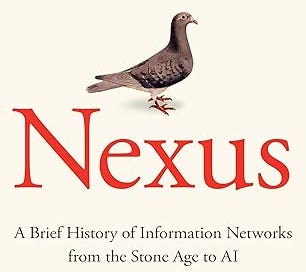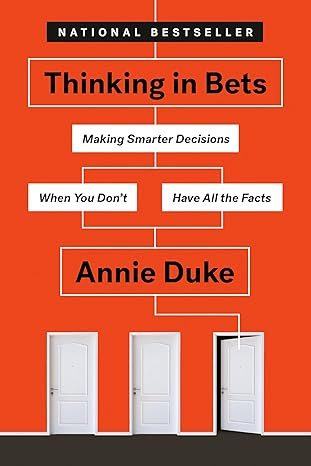How is it December already? I don’t know about you but 2024 has absolutely flown by for me. And what a year it has been — we got another 4 years of Trump, AI is everywhere, and Bitcoin crossed the $100,000 barrier for the first time! And that’s just on the last couple of months!
Thankfully some things don’t really change! I’m referring of course to my reading habit, which brings me to my top reads of 2024! These are the books that have changed the way I think in some significant way, and which I feel comfortable recommending to anyone who asks. I hope you find this list useful too.
Let’s dive in!
4. Nexus: A Brief History of Information Networks from the Stone Age to AI
I have a confession to make. I like dystopian novels and movies. While I’m an eternal optimist, I balance that out with trying to learn and understand what alternative realities could look like. Nexus falls very much in this category, leaning very dystopian at times but still providing incredible insights on how information systems evolve and shape societies.
One takeaway is the cycle of major information networks which, at first, amplifies power structures before eventually democratizing access. That aligns with the current rush for “more AI, faster” which is very much benefitting a few large organisations, like NVidia, Meta, Google and Microsoft but also points to a future where the long-term impact could be much better distributed and far reaching.
3. Thinking in Bets: Making Smarter Decisions When You Don't Have All the Facts
Some classic strategy books draw a comparison between business and chess which I think is fundamentally misguided. That’s why Thinking in Bets really resonated with me. It frames strategy and decision-making through the lens of poker instead, acknowledging a key truth about leadership: we're always operating with incomplete information in an environment we can't fully control.
A good decision can lead to a bad outcome, and vice versa.
My takeaway from this book is the idea of "resulting". Resulting is our tendency to equate the quality of a decision with the quality of its outcome. A good decision can lead to a bad outcome, and vice versa. This way of thinking has changed how I evaluate decisions in my team and puts additional focus on revisiting past decisions to improve future decision quality.
2. 1984 by George Orwell
You might wonder why I'm including a 75-year-old novel in this year's list. Reading (or re-reading) 1984 in 2024 feels like a punch in the gut with its relevance to current affairs. As the discussions on the ethics of AI, data privacy and the seemingly unlimited power of tech giants become part of daily conversations, 1984 offers a scaringly accurate view at a dystopian future ruled by a surveillance state.
But perhaps the most alarming aspect to me is how language is manipulated to limit society’s ability of having alternative thoughts. Just scroll through LinkedIn and you’ll see the platform has become flooded with AI-generated content that is sterile and devoid of any personality, let alone any critical thinking — much like 1984’s Newspeak, the mindless communication style predicted by George Orwell.
[LinkedIn] has become flooded with AI-generated content that is sterile and devoid of any personality, let alone any critical thinking
These AI-generated posts on LinkedIn and other platforms look like they tick all the right boxes but aren’t saying anything of substance. The worst part is when it’s a post from someone I’ve known for a while. I know what they normally “sound” like in writing. And suddenly you can see that 180 turn in their style that makes them sound like everybody else. It’s a shame so many people are losing their voice. I first noticed this about 10 months ago and it’s only gotten worse since…
Perhaps there’s room for a platform where people want to express themselves and can somehow block out Corporate Newspeak…
1. The Crux: How Leaders Become Strategists
My top pick for 2024 is Richard Rumelt's latest work on strategy. It’s technically a sequel to his excellent book Good Strategy/Bad Strategy. What I like about it is its practical approach to strategy as a problem-solving tool rather than a collection of buzzwords and vision statements. Strategy has lost all meaning in corporate life and it’s usually just a shorthand for wishful thinking.
The Crux builds on the "Strategy Kernel", a framework introduced by its predecessor composed of three elements: diagnosis, guiding policy, and coherent actions. Crucially, you have to start with diagnosis — most organizations fall short here and jump straight to actions without truly understanding their core challenge.
The strategy work begins when you go deeper and ask, “what’s the critical obstacle we need to overcome for the new reality to be true?”
The book's central argument is simple: good strategy isn't about setting ambitious goals but about identifying a key challenge — the crux — that, if solved, would unlock everything else. It’s still important to think about and aspire to what we want to be as a business, but that is not the strategy. The strategy work begins when you go deeper and ask, “what’s the critical obstacle we need to overcome for the new reality to be true?”
the term crux comes from rock climbing and bouldering, where the most difficult portion of a climb is the crux. It defines the difficulty and grading of the entire endeavor.
How about you? What were your top reads of 2024? Share them in the comments below! I’m always on the lookout for my next read!







